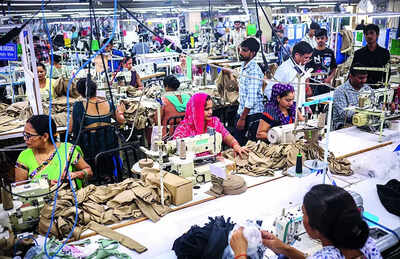ARTICLE AD BOX

Gurgaon: Either side of Delhi, the mood was grim Wednesday at India's largest export hubs for readymade garments as 50% tariffs announced by US President Donald Trump kicked in, coinciding with the start of India's festive season.The immediate effect is a halt in orders and bargaining from clients asking exporters to share the burden, industry insiders told TOI. Gurgaon and Noida house some of India's biggest garment exporters - from sequined tops to polo shirts, resort wear and kaftans - supplying brands like Target, GAP, Tommy Hilfiger, Ralph Lauren, Macy's, Zara and Walmart.India is the sixth largest exporter of textiles and apparel globally.
The additional 25% tariff, which Trump linked to India's purchase of Russian oil, comes as a hammer blow because nearly half of India's textile and apparel exports go to the US and EU. India makes about 22,000 million pieces of garments annually and in 2023-24 shipped textiles worth $34.4 billion.Ramandeep Singh of Boutique International feared closure of units and job losses since finding new markets won't be easy.
"Buyers called me and asked me to absorb at least 20-30% of the additional costs. I will give discounts for orders already in the pipeline, but it is not sustainable for future orders. Eventually, buyers will shift to Bangladesh, Pakistan, Cambodia and Indonesia, which have lower tariffs," Singh said, adding that firms dependent on the US for one-third of their business face the worst squeeze.Bangladesh and Vietnam - India's main competitors - now have a clear edge with their tariffs capped at 20%.Visharad Gautam, central executive committee member of Indian Industries Association (Greater Noida chapter), said earlier orders were shipped before the tariff kicked in. "The immediate effect is on raw materials. Bookings have almost stopped, which will soon affect production," he added.Job losses, according to Gautam, are inevitable if the tariff continues because textiles are India's most labour-intensive industry.
"Skilled workers are being retained since replacing them is difficult. Firms may lay off non-skilled staff," he said. The textile and apparel sector contributes 2.3% to India's GDP, accounts for 12% of exports and 13% of industrial output.Arvind Rai of Modelama Export said, "Industry representatives are talking to govt, but so far, there is no clarity. By the time govt wakes up, it might be too late. What will the industry do with support if there are no orders?"In this gloom, a silver lining is the margins garment businesses enjoy, one exporter said.
Margins will allow bigger players to retain the US clients by offering steep discounts that reduce profitability but keep them afloat.Gautam of IIA remained hopeful the disruption would not last. One reason, he said, is India's strategic role in the global supply chain. "Supply of raw materials to Bangladesh will be affected too. India cannot be ignored. For example, when political unrest disrupted Bangladesh, Indian orders increased 20%," he said.Vikash Gupta of Manesar Industry Welfare Association said exporters had rushed to ship whatever they could in recent weeks. "Today I received four calls from buyers and everyone was asking for discount. They expect 25-30%," said Gupta, who exports leather products to US. "My business is on a ventilator," he said.Satvir Singh, vice-president of CITU Haryana, said govt must roll out immediate measures to protect workers. "It (tariff) will affect workers and industry. Workers will come out on streets if jobs go. We will protest like farmers' agitation, if needed," he said.



.png)
.png)
.png)
















 7 hours ago
3
7 hours ago
3








 English (US) ·
English (US) ·